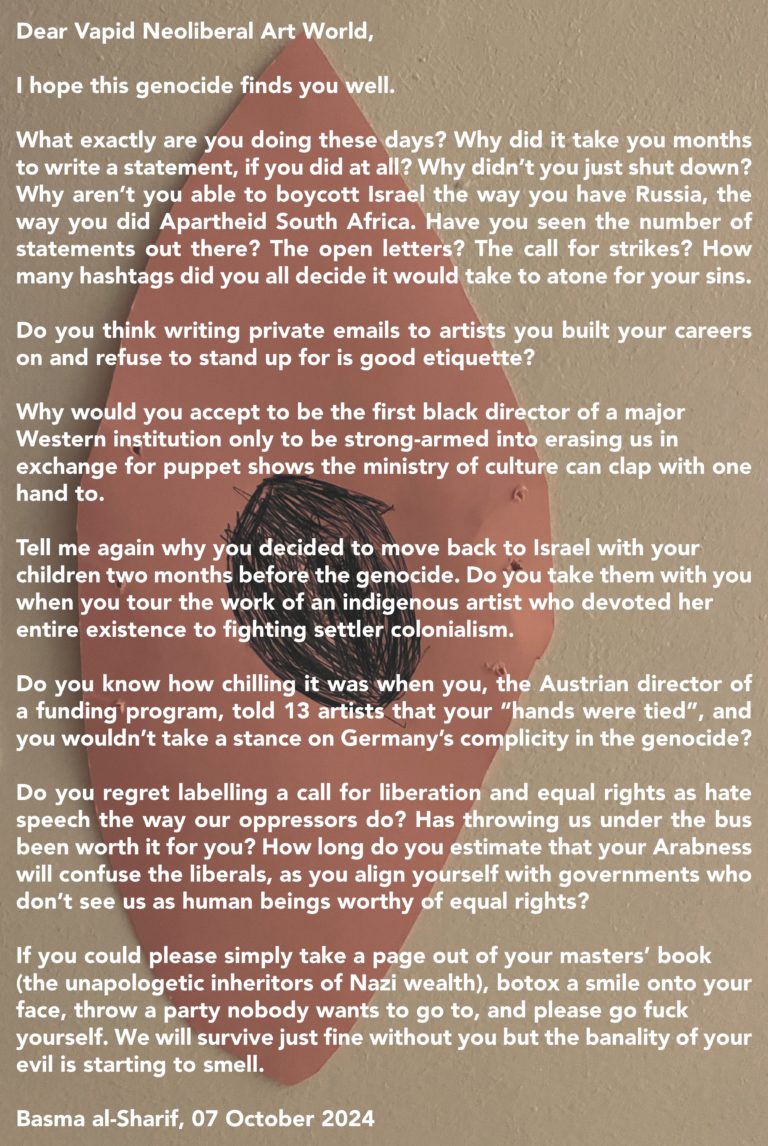Author: Zaina Shreidi
Germany has been grappling with the contradictions of its historical guilt and its current political stance on the Israeli-Palestinian conflict, leading to the repression of Palestinian culture and solidarity within its borders. This repression is not only a reflection of Germany’s troubling legacy—from the Herero and Namaqua genocide to the Holocaust—but also an extension of its support for the Israeli State, which has intensified since October 7th, 2023. As artists and cultural collectives face increasing censorship and funding cuts, many are opting out of State sponsorship to forge independent pathways of resistance, fostering community-driven initiatives that celebrate not only Palestinian, but intersectional identities and solidarity. This article explores how the fight for cultural independence serves as a vital form of resistance against both historical injustices and contemporary political repression in Germany.
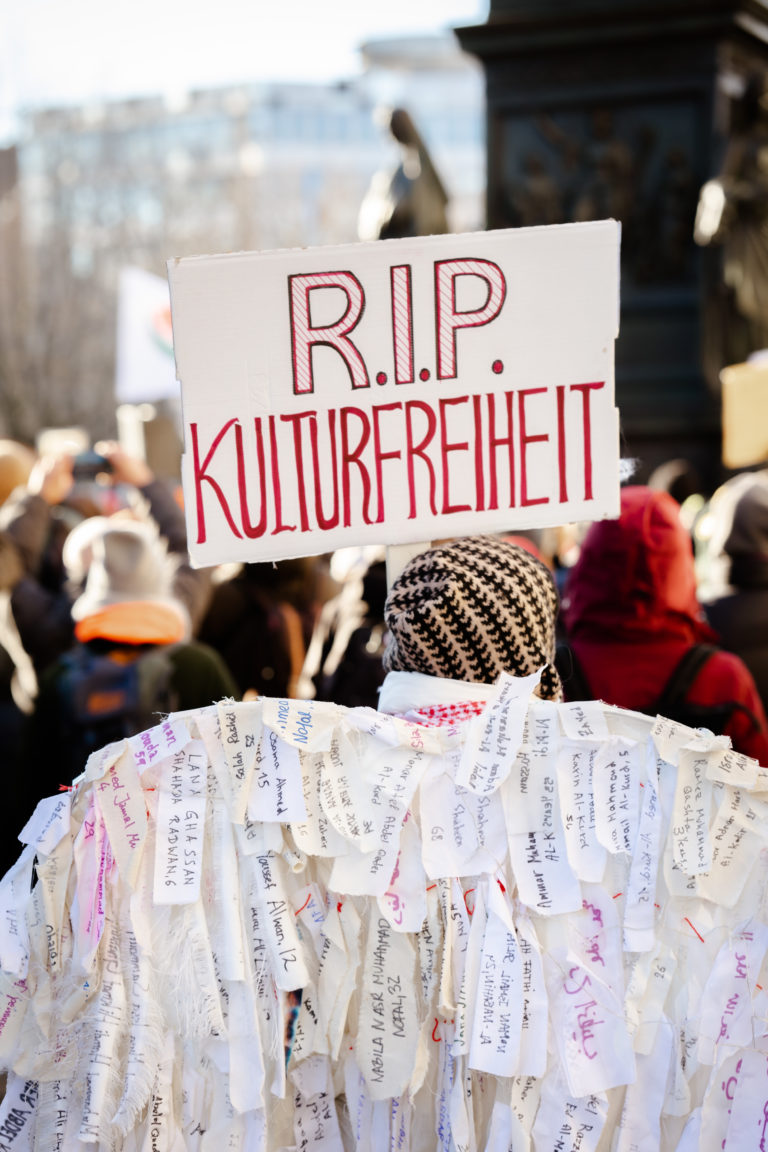
Protest against the IHRA clause in Berlin – © Esra Gültekin
After committing both the The Herero and Namaqua genocide and the Holocaust, Germany is financing and supporting yet another genocide, this time in Gaza. This is unsurprising, not only due to Germany’s historical propensity for committing genocides, but also for the role Germany played in the creation of the settler colony of “Israel”.[1] Support for "Israel" has come in the form of rising repression, silencing, defunding, and intimidation of Palestinian culture and solidarity in Germany. This has resulted in many artists and collectives refusing State funding and boycotting State funded institutions, instead finding solutions and opportunity in community and collectivity.
Antisemitic History and Staaträson
Germany is so committed to the settler-colony of “Israel” that they have made its existence their Staatsräson[2]–which refers to the importance of a State's interests, security, and survival above all other concerns. In German politics, this concept is frequently invoked to emphasise Germany's commitment to Israel's security and existence. The German State claims that, due to having committed the Holocaust, it has a special obligation to defend and support the existence of “Israel”.[3] In other words, their crime against the Jewish people (as well as the Roma, Sinti, and many more) is atoned for by their support for a Zionist colony built on the ethnic cleansing of Palestinians. This conveniently perpetuates the dangerous lie that they have denazified and atoned for the Holocaust, when in fact they are furthering their antisemitic agenda by replacing Jewish culture and identity with Zionism, an antisemitic ideology that echoes the racist narrative that Jewish people must be separated from Europe, and are not safe anywhere else in the world except in “Israel”. By supporting the Zionists in their ethnic cleansing and occupation of Palestine, Germany was able to wipe their slate clean in the sham political sphere of the West, and proceed to benefit off the crimes committed by their own victims, who have, in a twisted turn of events, become white supremacist perpetrators of genocide and ethnic cleansing.
Despite not having denazified, Germany brazenly assumed the pathetic guise of “German guilt”, as if it should receive pity for having to bear the burden of the crimes against humanity it committed. The lie of German guilt was quickly accepted by the equally Nazi and racist powers of the West, and is still used as a manipulative tool to silence criticism of Germany's dark past, as well as its antisemitic and racist present. It’s gotten to the point where the German State has self-proclaimed itself the expert on antisemitism, going as far as to claim that antisemitism has been “imported” by immigrants, in particular Palestinians and Muslims.[4] Knowing the context, it’s not so surprising, after all, that repression of Palestinian solidarity, activism, culture, and identity has taken place in Germany and throughout Europe long before October 7th.
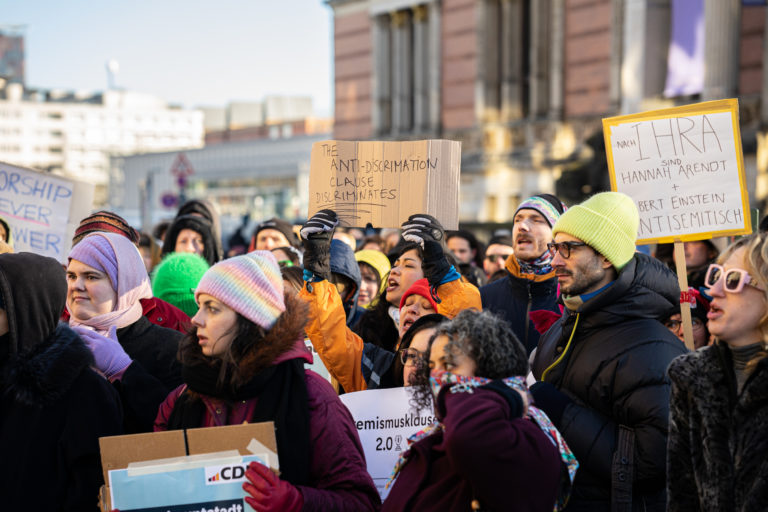
Protest against the IHRA clause in Berlin – © Esra Gültekin
A Long-standing Repression
Since the beginning of the genocide in Gaza, the latest stage of the ethnic cleansing campaign against the Palestinian people, Germany has seen constant protestations against their role in this genocide, which has included providing billions of euros in aid and military support, as well as political defense (such as their defense of “Israel” in the International Court of Justice[5]), and a commitment to repress and criminalise support for Palestinian freedom and resistance. Although repression of Palestinian solidarity long predates October 7th, as documented by the European Legal Support Center (ELSC), the German State has ramped up their attacks since the genocide began.
One of the tools the German State has used against State-funded institutions and organisations is withholding or cancelling funding as a means of exerting pressure and silencing dissenting voices. In other words, financial coercion. There have been several cases of the German State using its power to cut funding to organisations, remove individuals from positions they have earned, and withdraw invitations, exhibitions, and accolades. One of the first institutions to take a massive hit from the German State after October 7th is independent cultural centre Oyoun,[6] which had its funding completely cut without notification after refusing a request from the Berlin Senate to cancel an “evening of mourning and hope” hosted by the Jewish Voice for Peace. Oyoun responded to the Senate’s request with an explanation of their decision, but the Senate, in response, cut their funding without discussion or warning. This was a major hit to the cultural centre, which at the time employed over 40 predominantly BIPoC individuals, was home to the Ethiopian food collective adot, and served as an important space in Berlin for many people from the Global South. Since then, Oyoun has been defamed and slandered as antisemitic by German media such as Tagesspiegel, which Oyoun has won two defamation cases against.[7]
The German government isn’t just using their power to withhold funding from those who already have it, they are also making moves to prevent future funding from reaching anyone who criticises “Israel” as well. In January 2024, the German Ministry of Culture introduced the International Holocaust Remembrance Alliance (IHRA) clause. If passed, this clause would have required recipients of government funding to renounce any form of antisemitism according to their definition, which essentially claimed any criticism of the “Israeli” State as antisemitic.[8] The clause was barely averted thanks to relentless campaigning from art and culture workers, organised in collectives such as STRIKE Germany and the Arts and Culture Alliance Berlin (ACAB). The IHRA definition was, according to STRIKE Germany “increasingly becoming official State policy, effectively censoring criticism of the State of Israel and anti-Zionist perspectives from the German cultural sphere, furthering a dangerous false equivalency that ultimately harms the fight against antisemitism.”[9] The efforts against the dangerous IHRA clause were admirable, but there isn’t much time to rest in Germany. Just a few months after the IHRA scandal, Felor Badenberg, the Justice Senator from the CDU party[10] ludicrously demanded that the German domestic intelligence service (BfV) should decide which art should be eligible for funding, and which should not.[11] However, this proposal would actually affect anyone who receives funding from the State, not just the arts. This is an important development, as it puts one of Germany’s (and specifically Berlin’s) main markets at risk, while revealing the threat that freedoms of speech and expression pose to the State. It’s also evidence of the fascism spreading throughout the country, as one ridiculous clause, bill, and law is proposed after the other. Because it doesn't stop at withholding funding, Germany is now considering making a draft bill into a law that will allow immigration authorities to deport non-German citizens without court judgement if they “condone or glorify” a terrorist offence[12], with deeply narrow and unjustified definitions of what it means to “condone or glorify”, which can include a single comment or "like" on social media, and the loaded and often racist term of “terrorism”.[13] If passed, this racist law would use deportation as a weapon against free speech, and will of course disproportionately affect people from the Global South, in particular the most vulnerable people in society, such as asylum seekers, refugees escaping war, and queer people seeking refuge from homophobic societies and governments.
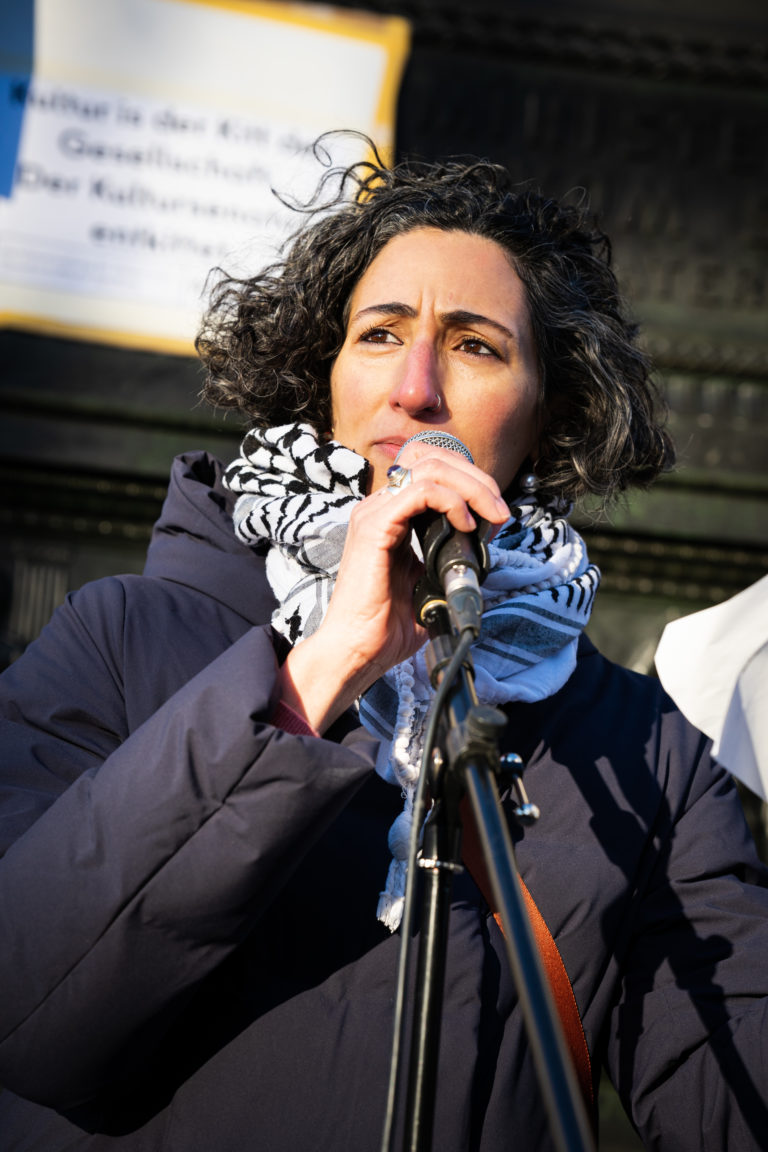
Yasmeen Daher at the protest against the IHRA clause in Berlin – © Esra Gültekin
Solidarity and Resistance for Continued Existence
In the cultural scene, resistance to the silencing and repression from the State has taken the form of solidarity events, calls for strike and boycott, and working on forming new structures to counter the capitalist, destructive system we live and work in.
Initiatives like STRIKE Germany, Ravers for Palestine, ACAB, and DJs Against Apartheid have made significant progress in arts, culture, music, and nightlife. STRIKE Germany has amassed over 2,000 signatures so far, with signatories including notable artists and intellectuals such as Turner Prize winners Jesse Darling, Lawrence Abu Hamdan, and Tai Shani, as well as Nobel Prize-winning writer Annie Ernaux, Iranian artist Natascha Sadr Haghighian, actor Indya Moore, and South African artist Candice Breitz, whose exhibition was cancelled by the German Saarland Museum without even informing the artist[14]. Ravers for Palestine has also supported STRIKE Germany’s call for strike by convincing international DJs and producers who have gigs in Germany to cancel, and supporting them financially with the strike fund they organise. They have even gone up against the notorious capitalist techno institution, Berghain.[15] Since Ravers for Palestine began their campaign, over 40 artists have cancelled their bookings, and more artists are becoming emboldened to do the same. Berghain’s policies show just how irrelevant and disconnected they are from the values they preach. Freedom isn’t found on a dancefloor that benefits from oppression, censorship, and repression.
In response to many venues and party collectives being either on the fence about their stance on genocide, or fully anti-Deutsch[16], many new solidarity events (or “soli” parties) have popped up in the last year, such as The Terminal Project, Dunya: Sudan, and Gaza Ya 7ayati, as well as regular events from collectives such as Diaspora Rising, Thawra, and Decolonoize Berlin. These events generally aim to centre voices from the Global South and allies, raise money for important and urgent causes in Gaza, Sudan, Congo, and other places gravely affected by imperialism, and of course offer safe(r) spaces for people to convene and build community during dark and polarising times. Many of the same people who are beaten by riot cops at demos show up to solidarity events to gain what the State attempts to take away–a sense of safety. These gatherings serve as a reminder of why we are doing what we do, and encourage us to keep returning to the streets, each time surrounded by more acquaintances turned friends, turned comrades who all have each others’ backs. It has also become standard practice for non-soli events, such as Subglow, to donate part of their profits, offer donation jars at the door, or sell merch that supports fundraisers like the Berlin Legal Fund or mutual aid campaigns.
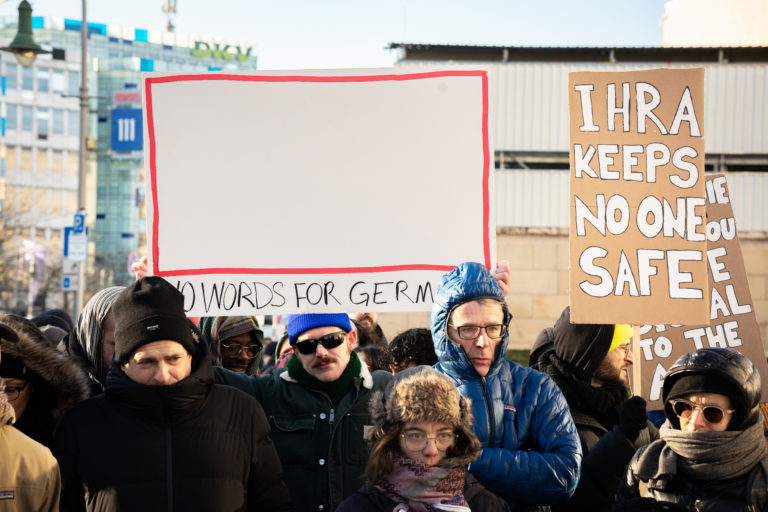
Protest against the IHRA clause in Berlin – © Esra Gültekin
Building Something New
The current situation in Germany exemplifies the need for independence, and the dangers of relying on State funding when the States in question are run by criminal governments. Arts and culture have always been targets of fascist States, with the rule being to either peddle propaganda or be silenced (and lose funding, opportunities, and the right to work at all). When it comes to physical venues, the need for independence is even greater, as they provide much needed space for silenced and suppressed voices to reach audiences, show their work, and potentially earn income or find employment. In Berlin, the venues who have persevered through the increasing repression and funding cuts have been the ones not relying on the State, such as Panke Culture, Oyoun, and 90mil. Without these venues, the power we have to gather, fundraise, and provide paid gigs for artists and cultural workers would be nearly impossible. Considering how difficult and costly it is to open and run a venue, the onus is on the already existing venues to sustain the scene until more can open. As repression increases, so does the pressure, but for independent venues there is a steady stream of attendees willing to spend their money in their establishments, providing a clear example of how the community can sustain itself, given the opportunity.
The belief that arts and culture cannot continue without government support has been internalised by many, but aside from simply being untrue, at this point cultural reform through self-organising is also a necessary and essential form of resistance in situations of such adversity. Building new systems and structures of support looks like bringing the community together and redistributing the funds that come in. It looks like booking and paying artists who are facing cancellations due to their identities or beliefs. It looks like cultural centres opening to the community, and being more inclusive, so that eventually everyone, not just the ones who can afford to, can make, experience, and enjoy art. The exchange-based social process is in itself the antithesis of the models that have destroyed our relationship to artistic and cultural practice. Rather than perverting art as entertainment for the masses, placing value of art in its commodification, and using art and culture to further the political agendas of those who hold the purse strings, a process of de-institutionalising is necessary to strip the oppressors of their power over us. And once we realise that, we can focus on joining together and building something new.
[1] Using quotation marks around “Israel” signifies that the author does not consider it to be a legitimate State, due to its colonial positions and actions. This goes in the same direction as writers mentioning russia without a capital letter to indicate its colonial stance and violence, especially towards Ukraine. Reset! ensures authors the freedom to use the writing standards they consider most appropriate.
[2] Staatsräson in English: ‘matter of state’ or ‘reason of state’; in French: raison d’État. “Principle according to which the highest standard of State action is the preservation and increase of the benefit of the State, even at the risk of violating moral and legal rules.”
Further explanation here: William Glucroft, "Israel und Deutschlands Staatsräson: Was bedeutet das?," Deutsche Welle, October 16th, 2023
[3] As of the publishing of this article, there has been no mention from the German State of a similar commitment to Namibia, and to this day reparations have not been paid, and white farmers of German descent own a majority of land in the country. Nosmot Gbadamosi, "Namibia Calls for Reparations Talks With Germany," Foreign Policy, March 13th, 2024
[4] Ruairí Casey, "Germany Should Stop Outsourcing Its Shame Over Historic Antisemitism to Migrants. An Interview with Esra Özyürek," Jacobin, December 5th, 2023
[5] "Nicaragua to ICJ: End Germany’s support of Israeli ‘genocide’ in Gaza," Al-Jazeera, April 8th, 2024
[7] "Another court decision in favor of Oyoun against Tagesspiegel," Oyoun, May 6th, 2024
[8] IHRA's working definition of antisemitism.
[9] “German cultural institutions have relied on the International Holocaust Remembrance Alliance (IHRA) definition of antisemitism, which is highly criticised for its ambiguity in conflating criticism of the State of Israel with antisemitism, as an internal guideline. The IHRA definition is increasingly becoming official state policy, effectively censoring criticism of the state of Israel and anti-Zionist perspectives from the German cultural sphere, furthering a dangerous false equivalency that ultimately harms the fight against antisemitism. STRIKE GERMANY demands that cultural institutions adopt the more precise guidelines, written in response to IHRA, proposed by the Jerusalem Declaration of Antisemitism (JDA). Cultural institutions must rely on JDA to counter the repressive climate sanctioned by IHRA’s ambiguity and focus the fight against antisemitism.”
[10] Christian Democratic Union of Germany.
[11] “Berlin's senator for justice demands that the Office for the Protection of the Constitution should decide which art is worthy of support in Germany - The Christian Democrat Felor Badenberg was formerly deputy head of the German domestic intelligence service. She now wants to appoint the latter as the supreme guardian of cultural funding.” (translated headline and subhead). Fatina Keilani, "Welche Kunst förderungswürdig sei, solle in Deutschland der Verfassungsschutz entscheiden, fordert Berlins Justizsenatorin," Neue Zürcher Zeitung, June 27th, 2024
[12] Peter Schwarz, "Deportation after one “like”—German cabinet tightens up deportation rules," WSWS, July 1st, 2024
[13] This type of intimidation is increasingly being used in Europe to incriminate opposition voices and academics who try to raise awareness of the need to support Palestine and its resistance. France is the country where the media are talking about it most, but it is also true in Germany.
Nadim Houry, "France’s Creeping Terrorism Laws Restricting Free Speech," Human Rights Watch, May 30th, 2018
Jérôme Latta, "'L’accusation d’apologie du terrorisme n’a jamais été autant utilisée pour museler une opposition'. Entretien avec Vanessa Codaccioni," Alternatives Économiques, June 1st, 2024
"Accusations de “terrorisme” : à qui le tour ?," Contre Attaque, Avril 23th, 2024
"Press Release: HAMAS and Samidoun banned in Germany," Federal Ministry of the Interior and Community, November 2nd, 2023
[14] Alex Greenberger, "German Museum Cancels Candice Breitz Exhibition After ‘Controversial Statements’ on Gaza," ARTnews, November 28th, 2023
[15] James Tapper and Isabelle Rodney, "DJs join Ravers for Palestine boycott of top Berlin techno club Berghain," The Guardian, August 10th, 2024
[16] Anti-Deutsch, in other words fascist Zionists claiming to be leftists, a specifically German phenomenon.
Published on October 8th, 2024
About the author:
Currently based in Berlin, Zaina Shreidi is a Palestinian event organiser, curator, booker, and writer passionate about Palestinian liberation, Global South unity, deconstructing and decolonising current funding structures, and creating new systems to replace the imperialist and capitalist ones suffocating our communities. Her experience in the DIY scene in Hungary helped her get practical experience in working collectively to create something out of nothing.
